

Lesson 17: Flour Baby, Part 1. Summary Ms.
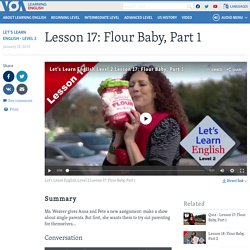
Weaver gives Anna and Pete a new assignment: make a show about single parents. But first, she wants them to try out parenting for themselves... Conversation Ms. Anna: We can interview single parents. Ms. Anna: Ourselves? Peter: Yeah, how do we do that? Lesson 17: Flour Baby, Part 1. Lesson 18: Flour Baby, Part 2. Summary Anna and Pete complete their parenting experiment.
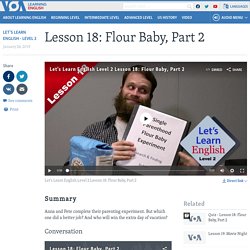
But which one did a better job? And who will win the extra day of vacation? Conversation Professor Bot: In Part 1 of this two-part lesson, Ms.
The Flatmates - Language Point 95. Reflexive Pronouns Exercise. Choose the correct answer for each sentence.
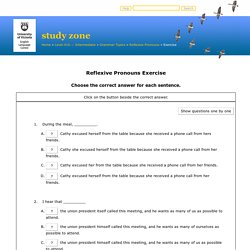
Click on the button beside the correct answer. During the meal, __________. Cathy excused herself from the table because she received a phone call from hers friends. Cathy she excused herself from the table because she received a phone call from her friends. Cathy excused her from the table because she received a phone call from her friends. Level 410 - Reflexive Pronouns. Certain pronouns are known as reflexive pronouns. 1.
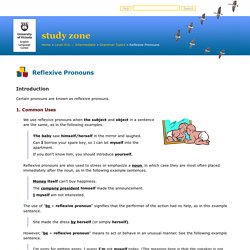
Common Uses We use reflexive pronouns when the subject and object in a sentence are the same, as in the following examples. The baby saw himself/herself in the mirror and laughed. Can I borrow your spare key, so I can let myself into the apartment. If you don't know him, you should introduce yourself.
Reflexive pronouns are also used to stress or emphasize a noun, in which case they are most often placed immediately after the noun, as in the following example sentences. Reflexive Pronouns 1. Type the correct form of the reflexive pronoun for each sentence.
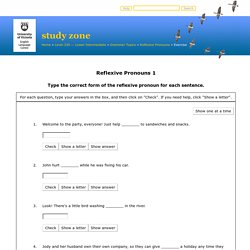
For each question, type your answers in the box, and then click on "Check". If you need help, click "Show a letter". Welcome to the party, everyone! Just help ________ to sandwiches and snacks.John hurt ________ while he was fixing his car.Look! There's a little bird washing ________ in the river.Jody and her husband own their own company, so they can give ________ a holiday any time they like.When I saw ________ in the mirror, I was horrified -- there was red paint on my nose! Is this sentence correct: "I itself don't know"? The word itself is an intensive pronoun and it is used to add emphasis to (or intensify) the word it.
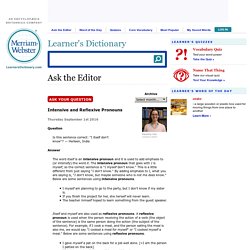
The intensive pronoun that goes with I is myself, so the correct sentence is "I myself don’t know. " This is a little different from just saying "I don't know. " By adding emphasis to I, what you are saying is, "I don't know, but maybe someone who is not me does know. " Below are some sentences using intensive pronouns. I myself am planning to go to the party, but I don't know if my sister is.If you finish the project for her, she herself will never learn.The teacher himself hoped to learn something from the guest speaker.
What Is a Reflexive Pronoun? Rules and Examples. Reflexive pronouns are words ending in -self or -selves that are used when the subject and the object of a sentence are the same (e.g., I believe in myself).
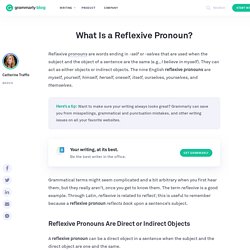
They can act as either objects or indirect objects. The nine English reflexive pronouns are myself, yourself, himself, herself, oneself, itself, ourselves, yourselves, and themselves. Here’s a tip: Want to make sure your writing always looks great? Grammarly can save you from misspellings, grammatical and punctuation mistakes, and other writing issues on all your favorite websites. Your writing, at its best. Be the best writer in the office. Get Grammarly Grammatical terms might seem complicated and a bit arbitrary when you first hear them, but they really aren’t, once you get to know them. A Guide to Reflexive and Intensive Pronouns. Sometimes, it’s all about me.
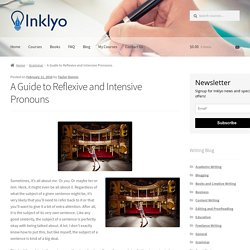
Or you. Or maybe her or him. Heck, it might even be all about it. Regardless of what the subject of a given sentence might be, it’s very likely that you’ll need to refer back to it or that you’ll want to give it a bit of extra attention. After all, it is the subject of its very own sentence. Think of the subject of a sentence as the star of a show.
Sentence Subjects: A Quick Refresher There are two components that make up every complete sentence: the subject and the predicate. Reflexive pronouns. Reflexive Pronouns. Loyal reader Bill P. and others have written in commenting on what seems to be a growing misuse of words known as reflexive pronouns.
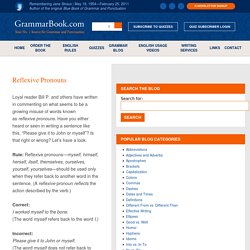
Have you either heard or seen in writing a sentence like this, “Please give it to John or myself”? Is that right or wrong? How to Use 'Myself' and Other Reflexive Pronouns. How to Use 'Myself' and Other Reflexive Pronouns. Reflexive and emphatic pronouns exercise.
Intensive Pronoun.